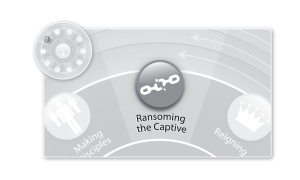Part VII of our series on Ransoming the Captive
 Before we progress any further into this series on Ransoming the Captive, we need to make one thing clear:
Before we progress any further into this series on Ransoming the Captive, we need to make one thing clear:
Jesus did not die for strangers. Nor did he die primarily for sinners. Nor did he die primarily for his enemies.
That the people he dies for are all these things—sinners estranged from God who are thus his enemies—is absolutely true and Scriptural. In fact, in Romans 5:8 the Apostle Paul even says, “but God shows his love for us in that while we were still sinners, Christ died for us.”
But listen to that verse again carefully:
“but God shows his love for us in that while we were still sinners, Christ died for us.”
Who did Christ die for? Not sinners. Us.
He died for us while we were sinners. But the best description of who Jesus died for is that he died for us, his beloved humanity, which, tragically, had become his sinfully estranged enemies.
And in this is a world of difference.
We must always remember that it is God’s nature to love human beings. Yes, he is full of righteous wrath toward sinners. But he did not create our race as sinners. He created us as his beloved children. The sin part we added in! So ransoming his beloved children is simply the costly but very natural consequence of his fatherly love toward us.
And that’s why, since the dawn of the race, he has done good to each one of us, fed each one of us, shared his bread with each one of us, opened his home to each one of us, visited and remembered each one of us, and healed and comforted each one of us. Having done all these things for each human being, would he not also give himself to ransom us from whatever separates us from him?
The Apostle Paul says it this way in Romans 8:32. It’s a short, simple passage that I would highly encourage you to memorize. Actually, don’t just memorize it. Meditate on it, and plant it in the deepest place of your ransomed heart:
He who did not spare his own Son but gave him up for us all, how will he not also with him graciously give us all things?
In the same way, when we Christians mirror his love to the world—when we do good to unlovable others in his name, sharing our bread with unlovable others in his name, open our homes to unlovable others in his name, visit and remember unlovable others in his name, heal and comfort unlovable others in his name, proclaim the Gospel in his name, forgive and reconcile in his name, and make disciples in his name, fall in love with unlovable others in his name…then why in the world would we not also give our lives in his name to ransom the unlovable others to whom we have given all these things? It is our reasonable and joyful worship.
So think of ransoming others as all eight other Works of Mercy extended across time, anchored by the decision to hold nothing back, even our own lives, until the unlovable other be freed in Jesus’ name.
This makes a lot of sense if you think for a moment about non-believers. If a non-believer’s family member gets kidnapped, he or she would of course sacrifice everything to meet demands for ransom. He or she would call the police, the TV station, every friend and relative and casual acquaintance who might possibly be able to help. And he or she wouldn’t try for just a day to raise the ransom. I’ve seen stories on TV of non-Christians who have been trying for more than a decade to free family members who have been kidnapped by the Contras or the Sandanistas or the FARCs or whoever the kidnapping group happens to be. They—these non-believers—put their own lives on hold and devote everything to the ransoming of captive family members.
So among Christians, when those God gives us to love—whether members of the family of God or captives we believe Christ is working to set free—are imprisoned, we should stream in from cities around the world bringing food, raising money, spending the night at the prison, helping the prisoner, defending him, strengthening him, lavishing everything on him because this is what we do in our family.
It’s how Christ taught us.
If a family member of yours were abducted, is there anything you wouldn’t do to get them back? How should that affect how we show love to captives?










